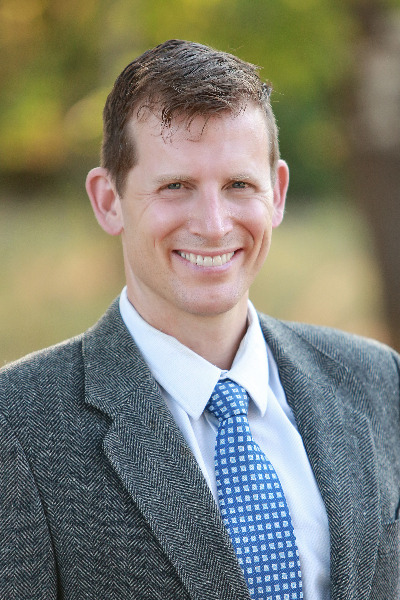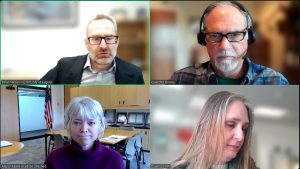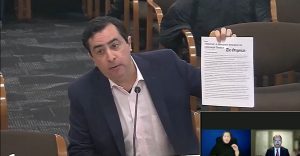Rep. Marty Wilde: Let’s come together to fix our part-time legislature
4 min read
by Rep. Marty Wilde
State Representative, House District 11
Iconic Oregon leaders David Frohnmayer and Wayne Morse, both originally Republicans, exemplified an approach to public service that we call The Oregon Way. At its core, the Oregon Way gives priority to the needs of the people of Oregon above all else—above party platforms, above ideology, and above personal ambitions. Recent political activity in Oregon shows that we have strayed from the difficult but principled path leaders on both sides of the aisle paved. Why do disappointed voters see politicians as hypocrites? Why do many elected officials claim core values that are seldom evident in their choices?
It’s all in the reward system.
Economists and psychologists tell us that people respond to incentives. Politicians are no different. Through part-time service, low pay, and unlimited campaign donations, Oregon’s current political system incentivizes politicians against serving their constituents’ interests. Until we change those incentives, we won’t see the Oregon Way – a combination of responsiveness to the public and a bipartisan spirit – that most voters want.
Part-time schedule. The legislative schedule makes it appear that Oregon legislators work only part-time. They are in session up to 160 days in odd-numbered years and 35 days in even-numbered years. But learning what constituents need and want and providing adequate constituent service amount to a full-time, year-round assignment. The part-time schedule creates gaps between the priorities of the voters and their legislators. In a two-year legislative cycle, there are only about 8 weeks for hearing new bills. This limited timeline allows lobbyists opposed to any concept to create delays long enough for a bill to miss that short window and fail.
Worse, all bills die if they are not passed at the end of the long session. They are not held over for consideration in the short session, so the work spent studying their value and potential effect is lost. Special interests repeatedly take advantage of this situation to kill bills they don’t like but that are responsive to constituent concerns.
Furthermore, the Executive Branch is less responsive and accountable to the people, because the legislature lacks the time to exercise proper oversight. If your unemployment check or rental assistance was delayed, you experienced the consequence of a part-time legislature. A full-time legislature best serves the people of Oregon in the modern age; the current time constraints empower special interests.
Low pay. Oregon legislators receive about $33,000 a year in pay, the minimum wage for state employees. The legislator salary is not sufficient to support a family anywhere in Oregon. That means legislators have to have outside jobs, which limit the time they can spend on legislative matters.
As an example of the impact of this time crunch, a racial justice bill I wrote for this year’s session failed because, in the words of one legislator, “We haven’t had enough time to consider it.” I had been actively soliciting input from every legislator for six months and had received none. Most legislators are diligent, but there is only so much time in the day. While this failure to act in the face of injustice was disappointing, it was also understandable. The people of Oregon need legislators who can work full-time on their behalf, not ones who have to limit their public service in order to feed their families.
Unlimited campaign donations also undermine action in the public interest. In the 2020 cycle, a corporation essentially bought a low-turnout primary with a $50,000 donation. We’ve repeatedly seen politicians elected with large donations from single sources reverse their campaign trail support for capping donations once they entered office. Just this year, five different proposals were killed, almost all through the actions of politicians purporting to support reforms.
Large campaign donations also drive policy decisions and discourage collaboration. Policies like non-partisan redistricting and open primaries, which empower citizens, have been killed repeatedly by special interests that benefit from the current system and pay to maintain it. Further, those special interests often do not support the sort of compromise favored by most voters; they withhold financial support from legislators they deem too moderate. The public is best served by a system that eliminates large donations and empowers citizen engagement by multiplying small donations.
A part-time legislative schedule, low pay, and unlimited campaign donations push politicians to act in ways contrary to both the public interest and their campaign promises. These adverse incentives push them away from the Oregon Way and toward the bitter partisanship that has come to dominate in Salem. This disconnect between advertised civic values and enacted policies is easy to label as hypocrisy and evidence of poor character. However, the deeper reality is that Oregon’s political system is rife with anti-democratic incentives. Until the voters change that, Oregon’s political class will continue to disappoint them.
Contact Rep. Wilde by email: wildefororegon@gmail.com






